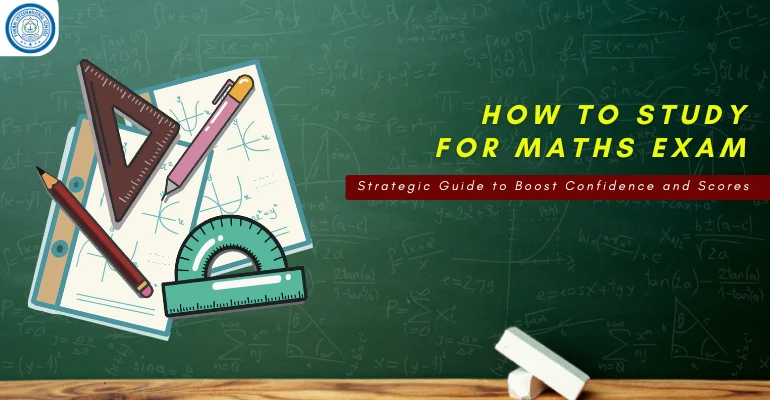How to Study for Maths Exam | Strategic Guide to Boost Confidence and Scores
February 7, 2025 2025-02-07 9:51How to Study for Maths Exam | Strategic Guide to Boost Confidence and Scores


How to Study for Maths Exam | Strategic Guide to Boost Confidence and Scores
Math exams often feel like a high-stakes puzzle—where one wrong step can unravel your progress. But what if you could transform anxiety into confidence? The secret lies not in cramming formulas but in adopting a structured, mindful approach.
Whether you’re a student at the Best A Level Schools in Mumbai or a self-learner, these research-backed strategies will help you master the art on how to study for maths exams.
Strategic guide on how to study for maths exam:


1. Start Early and Build a Strong Foundation
Success in math begins long before exam week. Start by reviewing class notes daily for 15–20 minutes to reinforce concepts while they’re fresh. Break down complex topics like algebra or geometry into smaller, manageable parts, ensuring you understand foundational principles before tackling advanced problems.
For instance, instead of memorizing the Pythagorean theorem, practice solving for all sides of a triangle to grasp its practical application. Schools like the Best A Level Schools in Mumbai emphasize this incremental learning style, helping students avoid last-minute panic.
2. Practice Actively—Not Passively
Math is a skill best honed through doing.
Replace passive rereading with active problem-solving:
- Use past papers to simulate exam conditions, identify weak spots, and improve time management.
- Solve unassigned textbook problems (e.g., even-numbered questions with answers in the back) to test genuine understanding.
- Teach concepts to a peer—explaining ideas aloud solidifies your grasp and reveals gaps in knowledge.
3. Leverage Technology and Resources
Modern tools can bridge learning gaps:
- AI-driven gap analysis tools like Maths Gap Analyst dissect past papers to highlight frequently tested topics (e.g., geometry proofs or statistical diagrams).
- Some Online platforms offer instant feedback on practice problems, while YouTube tutorials simplify abstract concepts through visual examples.
- Flashcards with formulas and theorems aid quick revision, but focus on understanding their derivations to apply them flexibly.
4. Optimize Your Study Environment and Mindset
A cluttered space breeds a cluttered mind. Create a distraction-free zone with organized notes, a reliable calculator, and ample lighting. Pair this with the Pomodoro Technique—25-minute focused sessions followed by 5-minute breaks—to maintain productivity without burnout.
Equally critical is mindset:
- Reward small wins (e.g., a 10-minute walk after solving 10 problems) to stay motivated.
- Address mistakes head-on: Track recurring errors in a journal and revisit them weekly.
5. Prioritize Health and Exam-Day Readiness
No study plan is complete without self-care. Cramming all night? Research shows that 8 hours of sleep enhances memory retention and problem-solving skills.
On exam day:
- Eat a brain-boosting breakfast (e.g., oatmeal with nuts) to fuel focus.
- Jot down key formulas immediately upon receiving the test to avoid mental blocks.
- Tackle easy questions first to build momentum and manage time effectively.
Closing Thoughts: Consistency is Key
Learning how to study for maths exam isn’t about shortcuts—it’s about consistency, curiosity, and adaptability. Pair these strategies with resources like past papers, AI tools, and collaborative learning to turn challenges into triumphs.
Remember, even students at the Best A Level Schools in Mumbai rely on relentless practice and structured revision to excel. So, grab your textbook, start early, and let every problem solved bring you one step closer to acing that exam!
Frequently Asked Questions (FAQs)
Ques 1. Is it better to memorize formulas or understand them?
Ans. Understanding formulas is more effective than rote memorization. Learn how formulas are derived and practice applying them to different types of problems. This helps in recalling and adapting them during exams.
Ques 2. How do I manage exam anxiety while solving maths problems?
Ans. Prepare thoroughly to build confidence. On exam day, take deep breaths, tackle easy questions first, and jot down key formulas as soon as the exam starts to avoid mental blocks.
Ques 3. How can I stay motivated while studying for maths exams?
Ans. Set small, achievable goals and reward yourself after completing tasks. Study with peers, use engaging learning resources like videos or apps, and track your progress to stay motivated.
Ques 4. How can I improve my mental math skills for quick calculations?
Ans. Practice basic arithmetic daily, use mental math apps, and challenge yourself with quick calculation drills. Learning shortcuts and approximation techniques also helps.
Ques 5. What should I do a day before the maths exam?
Ans. Focus on revision rather than learning new topics. Review key formulas, solve a few practice problems, and get a good night’s sleep to ensure your mind is fresh for the exam.



